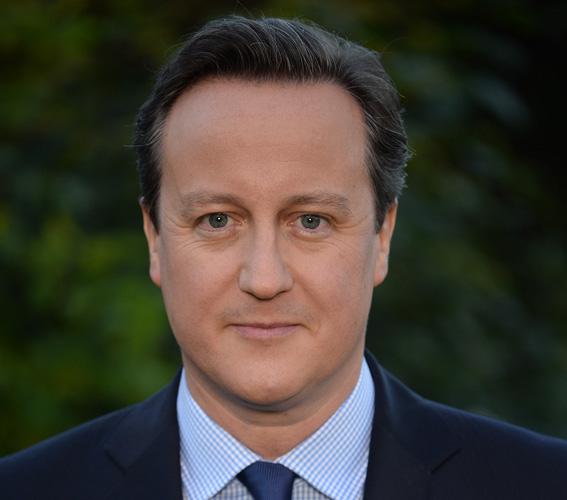デイヴィッド・キャメロン

デイヴィッド・キャメロン(英国)
元英国首相
David Cameron (United Kingdom)
Former Prime Minister of the United Kingdom (2010-2016)
こちらをクリックすると、長いプロフィールが読めます
デイヴィッド・キャメロン氏は、2010年から2016年の間、グレートブリテン及び北アイルランド連合王国首相を務め、およそ70年ぶりとなる連立政権を率いました。また、2015年総選挙においては、20年以上かなうことのなかった、保守党が単独過半数を占める政権を実現させました。その過程において、キャメロン前首相は、1812年に首相に就任したリバプール伯爵以来、最も若い首相になったほか、1期を務め上げた後に、所属政党の得票率と下院(庶民院)での議席数を伸ばした初めての首相となりました。これは、引き続き英国を立て直して欲しいという、キャメロン氏に対する国民からのわかりやすい付託でした。
キャメロン氏が首相に就任した2010年、英国は経済危機のさなかにあり、未曾有の財政課題が山積していました。キャメロン氏のリーダーシップのもと、英国経済は生まれ変わります。赤字は3分の2以上減少し、100万の企業が設立されたほか、同氏の首相在任期間中、一日あたり1000人のペースという、これまでに例を見ない数の雇用が創出されました。また英国は、主要先進国中、最高の経済成長率を記録しました。減税、全国生活賃金制導入、教育改革、社会保障の見直し、国民保健サービスの存続、そして年金の増額を敢行するにあたり、キャメロン前首相が必要とした安定がここに生まれました。
キャメロン氏が下したこれらの苦渋の決断により、英国経済が成長を続けるなか、生活保護に依存する世帯数は減少したほか、恵まれない環境で育った人々も含め、大学への進学率が急速に伸びました。また、国民の就業者数は英国史上最高となりました。
外交面に関し、キャメロン前首相は、ISISとの国際的な戦いにおいて、英国が全面的な役割を果たすことを明確にしながら、イラク戦争後の時代において、外交政策を組み立て、アラブの春にともなった新たな課題や、より強引なロシアへの対応にあたりました。同氏率いる英国は、インドと強固なパートナーシップを築いたほか、中国が好意的に接する西側諸国の1つとなりました。キャメロン氏は、一貫して米国との特別な関係を支持し、バラク・オバマ前米国大統領と緊密に協力しました。
キャメロン氏は、2012年にロンドンオリンピックおよびパラリンピックを、開催国首相として成功裏に終わらせ、その翌年には、北アイルランドのロック・アーンで開催されたG8サミットの議長を務めました。同氏はこのサミットにおいて、世界が協力して公正な税制や透明性向上、自由貿易を求めていく必要があると訴えました。このサミット、そして自身も共同議長として参加した、国連ハイレベルパネルによる2年間にわたる世界中での討議を受け、「持続可能な開発目標(SDGs)」が合意に至りました。同氏がとりわけ強力に後押ししたのが、あまりにも多くの人々が汚職、腐敗した政治、司法へのアクセスの欠落が原因で、貧困から抜け出せないでいるとした訴えでした。この訴えは、最終的にSDG16として採択されました。目標16の根底に流れる、平和で包摂的な社会や、司法へのアクセス、あらゆるレベルにおいて、効果的で責任ある包摂的な制度の実現という考えを、同氏は今もなお、世界全体が持つべき価値観であるとして支持しています。
2014年、キャメロン氏は、ウェールズのケルティックマナーにおいて開催された、NATOサミットの議長を務め、連合王国を構成する国のひとつ、ウェールズを、世界に向けてアピールしました。
大きな決断には真正面から挑む — キャメロン前首相の揺るぎない信条です。環境問題についても、キャメロン氏は、これまでで最も環境に配慮した政権を作ることを目標に対応してきました。この甲斐あって、英国は経済成長を達成しながらも、炭素排出量の大幅な削減に成功したほか、同氏は世界で初となるグリーン投資銀行を英国に誕生させ、気候変動に関するパリ協定においても、自国が主導的な役割を果たすことを明確にしました。
少なくとも国内総生産の2パーセントを、軍事費にあてるとしたNATOの目標をクリアし、国防予算の引き上げにも成功したキャメロン氏率いる英国は、同時に世界の最貧国のために立ち上がるべく、国民総所得の0.7パーセントを、開発援助に拠出するとした国連の方針にも応じました。世界の主要国の中では、この目標を達成した初めてで、そして現時点で唯一の国です。
キャメロン氏は、世界に先駆けて同性婚法案を成立させ、英国では愛し合う者同士であれば、性的区別に関わらず結婚できるようになりました。同氏は、首相在任中に3度の国民投票を実施していますが、初めての国民投票では、英国の選挙制度に関する長年の議論に決着をつけました。英国にとって、より決定的な結果をもたらした残り2つの国民投票ですが、うち1つでは、連合王国内でのスコットランドのあるべき姿を、もう一方では、EU内での英国のあるべき姿を国民に問いました。
いずれの国民投票においても、キャメロン前首相は自分が知る唯一の戦い方、つまり、自身の考えや信条を率直になおかつ情熱的に、頭と心と魂に語りかけるという戦い方で挑みました。スコットランド独立の是非を問う2014年の国民投票では、独立賛成派に勝利し、スコットランドが連合王国の一員であり続けることを保証しました。しかし、英国はEUの一員であり続けたほうが、より強くて安全で、なおかつより良い未来を目指せる、と訴えた同氏の声もむなしく、2016年6月の国民投票ではEU離脱が決まりました。この結果を受け、キャメロン氏は首相および保守党党首を退任し、2016年7月13日にダウニング街10番地(首相官邸)を去りました。そして同年9月、議員を辞職しました。
キャメロン氏が保守党党首に就任したのは2005年のことで、その時点での議員としての経験は、5年にも満たないものでした。同氏は、3回連続で選挙に負けていた保守党の、改革と近代化を任されたのです。近代的で思いやりのある保守主義への自信を支えに、党首選に出馬したキャメロン氏ですが、その後およそ70年の間で初めてとなる、連立内閣の立ち上げに彼を奮い立たせたのも、首相として一国を引っ張っていく彼のビジョンの先にあったのも、この自信でした。
キャメロン氏は、保守党党首として社会的正義と行動を訴え、環境問題に切り込み、国民保健サービスの存続を優先課題に掲げました。そして、これまでとは比べものにならない数の、女性やエスニックマイノリティが保守党から出馬し、議員に選出される姿を誇らしく見守ってきました。
キャメロン前首相が描く理想の国像は一貫しています。出自に関わらず誰もが成功できる国。恵まれない人々を常に思いやる国。国民が一丸となれる国。突き詰めてみれば、大志、思いやり、責任感、自由という核心的な価値観に行き着きます。同氏にとって、重要な意味を持つこれらの想いは、保守党党首、そして首相としての彼を支えていました。そして同じく、同氏の一つの国家ビジョンの根源に流れるものです。
2001年に、ウェスト・オックスフォードシャー農村部のウィットニー選挙区から選出されたキャメロン氏は、保守党党首に選ばれるまでに、野党幹部として様々な役職につきました。2005年の総選挙後は、影の教育・技能大臣に指名されました。それ以前に任命された役職には、影の庶民院院内副総務(2003年)、地方財政所掌フロントベンチ・スポークスマン(2004年)のほか、2005年5月の総選挙に向けた政策調整会長があります。また、2001年から2003年にかけては、影響力を持つ庶民院内務特別委員会メンバーを務めました。
キャメロン氏は、議員になるまでに民間企業や公的機関で仕事をした経験があります。イートン校からオックスフォード大学ブレーズノーズ・カレッジに進学し、哲学・政治・経済(PPE)を学び、一級優等学位を授与されました。卒業後は保守党調査部にて、マーガレット・サッチャーならびに、ジョン・メージャー元首相のもとで勤務し、メージャー元首相の議会質疑応答を補佐しました。その後、まずは財務大臣、続いて内務大臣の政府特別顧問に任命されました。この後、英国の大手メディア企業であるカールトン・コミュニケーションズにて7年間を過ごし、役員を務めました。
ダウニング街10番地を後にしてからも、キャメロン氏は首相在任中に進めていた、若者の生きがい支援と社会制度の拡大・強化、英国が誇る最新医療研究の擁護、そして国際開発の推進などへの取り組みを続けてきました。
キャメロン氏は、全国各地から10代の若者を集め、半住み込み型で30時間地元のコミュニティ・プロジェクトに奉仕するという、英国の青少年育成プログラムの旗艦であるNational Citizen Service(NCS)の後援会長を務めています。
また、認知症の原因、予防、治療の生体医学研究に対する資金援助を専門とした、英国の代表的な医学研究向け慈善団体である、アルツハイマー・リサーチUKの会長でもあります。
首相として、国連の持続開発な開発目標16の提唱において、重要な役割を担ったキャメロン氏は、International Growth Centreを後ろ楯に持つ、LSE-Oxford Commission on State Fragility, Growth and Developmentの会長として、ロンドン・スクール・オブ・エコノミクス、およびオックスフォード大学のブラバトニック公共政策大学院と連携してきました。2018年4月に、同委員会が発表した報告書「Escaping the Fragility Trap」では、国家の脆弱性、および国際援助への新たなアプローチとなる提案が挙げられました。さらに、外交問題評議会世界理事と、ワン・キャンペーン理事も務めています。
これらの役職に加え、キャメロン氏は、テクノロジー、ファイナンス、メディカルイノベーション分野を専門とする、多くの国際企業に顧問として協力しています。
デイヴィッド・キャメロン氏にとって、政治家、そして首相としてのキャリアを支えた家族は、常に最も重要な存在です。デイヴィッドとサマンサ夫妻にはナンシー、エルウェン、そして、首相在任中の2010年に生まれたフローレンスの、3人の子供がいます。最愛の長男イバンは、脳性麻痺と難治性てんかんの一種大田原症候群を患い、残念ながら、 2009年にわずか6歳で他界しました。
ダウニング街を去ってから、サマンサ・キャメロンは自身のファッションブランド「CEFINN」を立ち上げ、クリエイティブ・ディレクター兼創始者として経営しています。現在、キャメロン一家は、ロンドンとウェスト・オックスフォードシャーに暮らしています。
Click for a long profile
David Cameron served as Prime Minister of the United Kingdom of Great Britain and Northern Ireland from 2010 to 2016, leading Britain’s first Coalition Government in nearly 70 years and, at the 2015 General Election, forming the first majority Conservative Government in the UK for over two decades.
In doing so, he became the UK’s youngest Prime Minister since Lord Liverpool in 1812 and, in 2015, the first ever British Prime Minister to increase both his party’s share of the vote and their number of seats in the House of Commons, having already served a full term as premier. It was a clear mandate from the British people and a simple instruction: to continue turning the country around.
David Cameron came to power in 2010 at a moment of economic crisis and with an unprecedented fiscal challenge. Under his leadership, the UK’s economy was transformed. The deficit was reduced by over two-thirds; one million businesses set-up; a record number of jobs were created: 1,000 extra jobs for every day he was Prime Minister; and Britain became the fastest-growing major advanced economy in the world. That created the stability David needed to cut taxes, introduce a National Living Wage, transform education, reform welfare, protect the National Health Service, and increase pensions.
The difficult decisions he took meant that while the economy grew, the number of families stuck on welfare fell; the number of students attending university – including those from disadvantaged backgrounds – increased rapidly; and the number of people in work was higher than at any previous point in British history.
Internationally, David Cameron developed a foreign policy in the post-Iraq era that addressed the new challenges of the Arab Spring, as well as a more aggressive Russia, while ensuring that Britain played a full role in the global fight against ISIS. Under his leadership, Britain built a strong partnership with India and became China’s preferred partner in the West. Throughout, David championed Britain’s special relationship with the US, working closely with President Barack Obama.
Following hosting the successful London 2012 Olympic and Paralympic Games, David chaired the 2013 G8 Summit at Lough Erne in Northern Ireland, where he highlighted the global need for fair taxes, increased transparency and open trade. Following this, and a two-year worldwide discussion led by a UN high level panel, which he co-chaired, the Sustainable Development Goals were agreed. In particular, David advocated for what is now SDG 16 – the idea that too many people are held back in poverty because of corruption, rotten government, and lack of access to justice. The principles underpinning Goal 16 – peaceful and inclusive societies; access to justice; and effective, accountable and inclusive institutions – are international values David continues to champion.
In 2014, David promoted another country of the United Kingdom, by chairing the NATO Summit at Celtic Manor in Wales.
David always believed that he should confront the big decisions. He championed environmental issues with the aim of delivering the greenest ever government – as such he grew the British economy while carbon emissions fell sharply; created the world’s first Green Investment Bank; and ensured that the UK played a leading role in the successful Paris Agreement on climate change.
Under his leadership, the UK committed to the NATO 2 per cent defence spending target and a rising national defence budget, but also stood up for the world’s poorest by meeting the UN commitment of 0.7 per cent aid and development spending – the first, and so far only, major country in the world to do so.
He led the way internationally by passing the UK’s Same Sex Marriage Act, enabling those who love each other to get married whatever their sexuality; settled the UK’s voting practices for a generation through the first of three national referenda held while he was in No10; and offered two more decisive national votes: the first on Scotland’s place within the United Kingdom; the second on the United Kingdom’s place within the European Union.
David fought both campaigns the only way he knew how, which was to say directly and passionately what he thought and believed was right – head, heart and soul. In winning the 2014 Scottish referendum he ensured Scotland remained part of the United Kingdom. However, despite arguing that Britain was stronger, safer and better off inside the European Union, in June 2016, the British people voted to leave the EU. Following this defeat, David resigned as Prime Minister and Leader of the Conservative Party, leaving 10 Downing Street on 13 July 2016. In September 2016, he resigned as a Member of Parliament.
David Cameron became Leader of the Conservative Party in 2005, after serving less than five years as a Member of Parliament. He was elected on a mandate to reform and modernise a party that had lost three elections in a row. Believing in a modern compassionate conservatism is why David ran for Leader; it is what led him to form the UK’s first Coalition Government in seven decades; and it is how he governed as Prime Minister.
During his leadership of the party, he promoted social justice and social action; advanced the green agenda; set protecting the NHS as a top priority; and was proud to see a significant increase in the number of women and ethnic minority candidates standing for the Conservative Party and elected to Parliament.
His vision has always been of a country where everyone – whatever their background – can succeed; where we always look out for those who are less fortunate; where every part of the country is brought together. Ultimately, it comes back to some core values: aspiration, compassion, responsibility, freedom. These are the things David believes in. They underpinned his leadership of the Conservative Party and his premiership, and they lie at the heart of his One Nation vision.
As the Member of Parliament for the rural constituency of Witney in West Oxfordshire from 2001, David held a number of positions on the Opposition Front Bench prior to becoming Party Leader. After the 2005 General Election, he was appointed Shadow Secretary of State for Education and Skills. He had previously held the positions of Shadow Deputy Leader of the House of Commons (2003); Front Bench Spokesman for Local Government Finance (2004); and Head of Policy Co-ordination in the run-up to the General Election of May 2005. He was also a member of the influential House of Commons Home Affairs Select Committee between 2001 and 2003.
Before he became a Member of Parliament, David worked in business and government. He was educated at Eton College and Brasenose College at Oxford University, studying Philosophy, Politics and Economics (PPE) and gaining a First Class Honours degree. After graduating he joined the Conservative Research Department where he worked for Prime Minister Margaret Thatcher and her successor John Major, who he advised for Prime Minister’s Question Time. He was later appointed a Special Adviser in government, first at the Treasury and then at the Home Office. Afterwards, he spent seven years at Carlton Communications, one of the UK’s leading media companies, and served on the management board.
Since leaving 10 Downing Street, David has continued focusing on issues he advanced while in office: supporting life chances for young people and building a bigger, stronger society; championing Britain’s cutting edge medical research; and promoting international development.
David is Chairman of Patrons at National Citizen Service (NCS), the UK’s flagship youth development programme that brings together teenagers from all parts of the country for a part-residential experience, with 30 hours committed to a local community project.
He is also President of Alzheimer’s Research UK, Britain’s leading medical research charity with special focus on funding bio-medical research into the cause, prevention and cure of dementia.
And continuing the instrumental role he took while Prime Minister advocating UN Sustainable Development Goal 16, he has been working with the London School of Economics and Blavatnik School of Government at Oxford University by chairing the LSE-Oxford Commission on State Fragility, Growth and Development, under the auspices of the International Growth Centre. In April 2018, the Commission produced a report, Escaping the Fragility Trap, with recommendations that amount to a new approach to state fragility and international aid. He also sits on the Global Board of Advisors at the Council on Foreign Relations and is a Board member of the ONE Campaign.
Further to these roles, David is advising and working with a number of international businesses, concentrating on technology, finance and medical innovation sectors.
Family has always been the most important part of David Cameron’s life, sustaining him through his political career and premiership. David and his wife, Samantha, have three young children: Nancy, Elwen, and Florence, who was born in 2010 while her father was Prime Minister. Very sadly their much-loved eldest child, Ivan, who suffered from cerebral palsy and Ohtahara Syndrome, a rare and severe form of epilepsy, died in February 2009, aged six.
Since leaving Downing Street, Samantha Cameron has started her own fashion label, CEFINN, which she runs as Creative Director and Founder.
The family live in London and West Oxfordshire.
